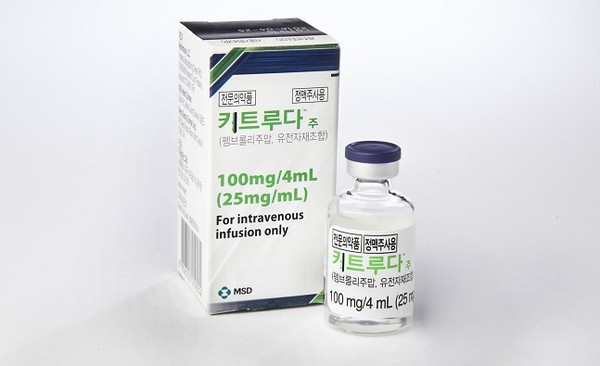MSD Korea said Tuesday that it has confirmed the efficacy of PD-1 inhibitor Keytruda (ingredient: pembrolizumab) in treating Bacillus Calmette-Guerin (BCG)-unresponsive and non-muscle-invasive bladder cancer patients regardless of cystectomy or presence of papillomas.

In phase 2 KEYNOTE-057 trial that analyzed the efficacy of Keytruda monotherapy, the company confirmed that 39 of 96 patients with BCG-unresponsive carcinoma with or without papillary tumors had a complete response at three months, recording a 41 percent complete response rate.
The median duration of complete remission response was 16.2 months, and grade 3 or 4 adverse events related to treatment occurred in 13 patients, with the most common symptoms were arthralgia and hyponatremia. Eight patients underwent serious treatment-related events, but no one died of the therapy.
Patients received 200 milligrams of Keytruda intravenously every three weeks for 24 months or until the disease’s persistence, recurrence, progression, and unacceptable toxic effects were confirmed.
Transurethral resection of bladder followed by intravesical injection of Bacillus Calmette-Guerin (BCG) has been used as the standard treatment for non-muscle-invasive bladder cancer.
Despite the high initial response rate, however, nearly half of patients relapsed or did not respond to BCG, and radical cystectomy had to be considered for them.
A radical cystectomy removes the entire bladder, lowering patients' quality of life as they have to urinate using an artificial bladder or urine drainage bags. When patients could not or refused to receive the surgery, they had no other effective treatments before Keytruda's approval.
"Keytruda is a new treatment for high-risk non-muscle-invasive bladder cancer patients who had no other treatment options than radical cystectomy, providing a new way to continue treatment without having their bladder removed," MSD Korea Oncology Business Unit Head Kim Sung-phil said. "We are continuing research and development to provide hope for a cure without compromising the patient's quality of life in carcinomas that require new therapies."
The study result was published on LANCET Oncology in May. Based on the research, MSD won the regulatory approval for Keytruda as a new immune therapy for non-muscle-invasive bladder cancer in 20 years.

